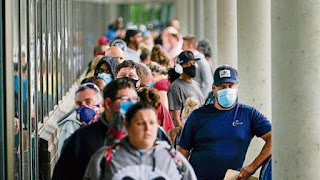2020
WHAT IS HAPPENING IN THE US, A STRONG SHOCK ON THE LABOR MARKET.
A shock in the job market
Klotz affirms that this whole panorama implies a very complex situation for companies, although he points out that they are already designed to deal with the demands of retaining their workers and finding new talent.
"What makes this a unique challenge is the type of work arrangement (post-pandemic) because for most companies there is no right answer in terms of how much flexibility they should give their employees.
"Hopefully many organizations are talking to their workers to understand what they want, but in the end companies will have to make a decision and say 'this is what we're going to do'. And there will be some employees who are not going to be happy, including - probably - several of the best," he says.
“This is like a kind of big shake-up: there will be companies that will want to go back to face-to-face work entirely, some will choose to go completely remote and others will choose a hybrid format and workers will look for jobs in those that offer the form of work they want”, add.
Cassie Whitlock, head of human resources at the BambooHR talent management platform, believes that companies that want to force workers back into the office are in the greatest danger of losing them.
"Employees have been working remotely for a year and it's been working. They're going to want to know why they can't keep doing it. If you're going to ask them to come back, you better make a compelling case," Whitlock told Fast Company.
Klotz doesn't necessarily see anything wrong with some organizations wanting to return to the pre-pandemic "normal" way of working, but he warns that many will find that their employees want a "new normal."
“It may be that going back to the office is the right thing for their type of business, but they will probably risk losing employees who want that new normal. These companies will also lose opportunities in terms of competing for talent in the job market. because those that offer greater flexibility in terms of remote and hybrid work have more possibilities to recruit workers globally," he says.
Klotz believes that one of the long-term consequences of all these changes in the labor market will be that workers will have many more options in terms of different workday arrangements: face-to-face, remote and hybrid.
"It is possible to imagine that at different stages, you will be able to choose the formula that best suits you. Probably when you are 20 years old you will want to be in the office; at 30 years old, with a young family you will look for a hybrid model and later on, you will opt for work Thus, you will be able to forge this type of career, something that was really very difficult to do before the pandemic, "he concludes







.png)

Publicar un comentario
0 Comentarios